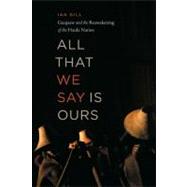
What is included with this book?
| Then and Now | p. 1 |
| Land Troubles | p. 16 |
| The Spirit Rushes in the Blood | p. 42 |
| Out of Hand | p. 65 |
| Drum | p. 84 |
| The Same as Everyone Else | p. 98 |
| They Say | p. 124 |
| Pushing Back | p. 150 |
| This Box of Treasures | p. 165 |
| A Recognizable Culture | p. 182 |
| How the World Gets Saved | p. 206 |
| Yes, We Can | p. 224 |
| What Is to Come | p. 243 |
| Chronology of Events | p. 255 |
| Notes | p. 261 |
| Selected Bibliography | p. 297 |
| Acknowledgements | p. 305 |
| Index | p. 309 |
| Table of Contents provided by Ingram. All Rights Reserved. |
The New copy of this book will include any supplemental materials advertised. Please check the title of the book to determine if it should include any access cards, study guides, lab manuals, CDs, etc.
The Used, Rental and eBook copies of this book are not guaranteed to include any supplemental materials. Typically, only the book itself is included. This is true even if the title states it includes any access cards, study guides, lab manuals, CDs, etc.